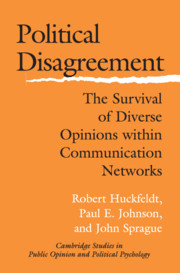Book contents
- Frontmatter
- Contents
- List of Figures
- List of Tables
- Acknowledgments
- 1 COMMUNICATION, INFLUENCE, AND THE CAPACITY OF CITIZENS TO DISAGREE
- 2 NEW INFORMATION, OLD INFORMATION, AND PERSISTENT DISAGREEMENT
- 3 DYADS, NETWORKS, AND AUTOREGRESSIVE INFLUENCE
- 4 DISAGREEMENT, HETEROGENEITY, AND THE EFFECTIVENESS OF POLITICAL COMMUNICATION
- 5 DISAGREEMENT, HETEROGENEITY, AND PERSUASION: HOW DOES DISAGREEMENT SURVIVE?
- 6 AGENT-BASED EXPLANATIONS, PATTERNS OF COMMUNICATION, AND THE INEVITABILITY OF HOMOGENEITY
- 7 AGENT-BASED EXPLANATIONS, AUTOREGRESSIVE INFLUENCE, AND THE SURVIVAL OF DISAGREEMENT
- 8 HETEROGENEOUS NETWORKS AND CITIZEN CAPACITY: DISAGREEMENT, AMBIVALENCE, AND ENGAGEMENT
- 9 SUMMARY, IMPLICATIONS, AND CONCLUSION
- APPENDIX A THE INDIANAPOLIS–ST. LOUIS STUDY
- APPENDIX B THE OPINION SIMULATION SOFTWARE
- References
- Index
2 - NEW INFORMATION, OLD INFORMATION, AND PERSISTENT DISAGREEMENT
Published online by Cambridge University Press: 03 December 2009
- Frontmatter
- Contents
- List of Figures
- List of Tables
- Acknowledgments
- 1 COMMUNICATION, INFLUENCE, AND THE CAPACITY OF CITIZENS TO DISAGREE
- 2 NEW INFORMATION, OLD INFORMATION, AND PERSISTENT DISAGREEMENT
- 3 DYADS, NETWORKS, AND AUTOREGRESSIVE INFLUENCE
- 4 DISAGREEMENT, HETEROGENEITY, AND THE EFFECTIVENESS OF POLITICAL COMMUNICATION
- 5 DISAGREEMENT, HETEROGENEITY, AND PERSUASION: HOW DOES DISAGREEMENT SURVIVE?
- 6 AGENT-BASED EXPLANATIONS, PATTERNS OF COMMUNICATION, AND THE INEVITABILITY OF HOMOGENEITY
- 7 AGENT-BASED EXPLANATIONS, AUTOREGRESSIVE INFLUENCE, AND THE SURVIVAL OF DISAGREEMENT
- 8 HETEROGENEOUS NETWORKS AND CITIZEN CAPACITY: DISAGREEMENT, AMBIVALENCE, AND ENGAGEMENT
- 9 SUMMARY, IMPLICATIONS, AND CONCLUSION
- APPENDIX A THE INDIANAPOLIS–ST. LOUIS STUDY
- APPENDIX B THE OPINION SIMULATION SOFTWARE
- References
- Index
Summary
Citizens confront new information in the context of old information, and they are likely to discount information that is not easily reconciled with the information they have already encountered. In this way, political influence is inherently autoregressive – the influence of any information source depends on the influence of every other source. This discounting of politically divergent information has several consequences. First, attitudes and opinions are resistant, but not invulnerable, to political change. In particular, new information is unlikely to gain acceptance until it is widely communicated from a variety of sources. Second, the autoregressive nature of influence helps to explain the persistence of disagreement among citizens. Two individuals who interact on a regular basis are more likely to demonstrate sustained disagreement if (1) their remaining networks of contacts are non-overlapping and (2) these networks transmit divergent political messages. In this way, the continuing experience of disagreement and political diversity depends on the configuration of the communication networks within which citizens are located, and particularly on low density, asymmetric patterns of communication.
Political interdependence and communication among citizens has little consequence if individuals reside in self-contained, politically homogeneous groups. In settings such as these, new information cannot easily penetrate the social barriers that surround the individual. If you are a liberal Democrat, and all your friends are liberal Democrats, the odds are very high that you will never hear one of your friends make a passionately convincing argument in favor of tax cuts.
- Type
- Chapter
- Information
- Political DisagreementThe Survival of Diverse Opinions within Communication Networks, pp. 25 - 45Publisher: Cambridge University PressPrint publication year: 2004



